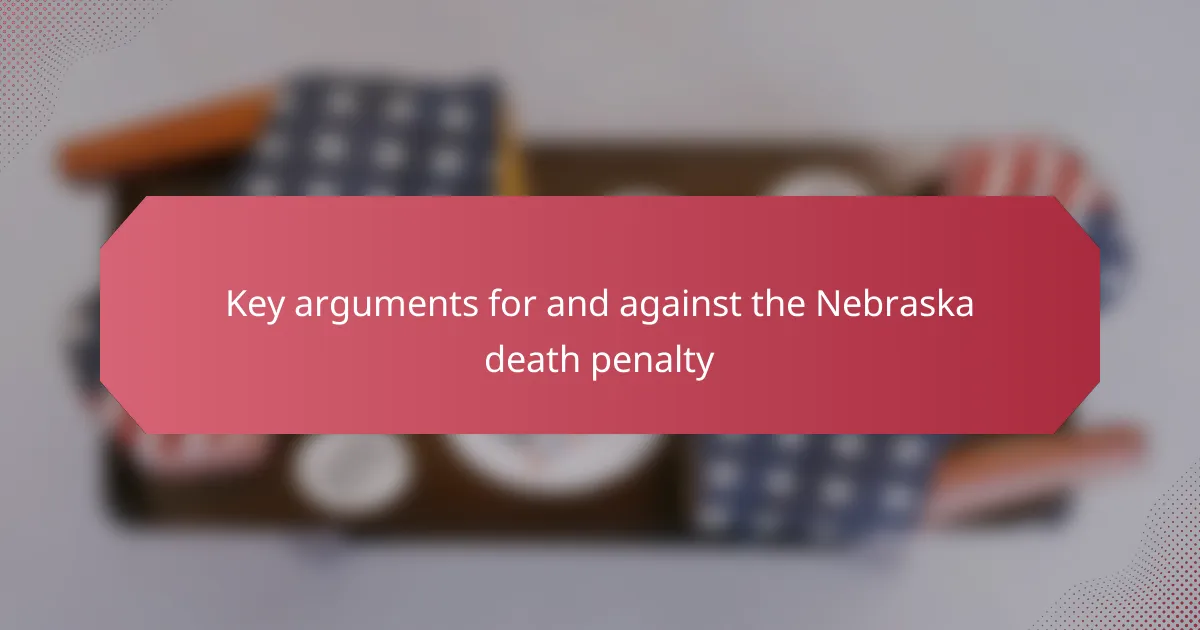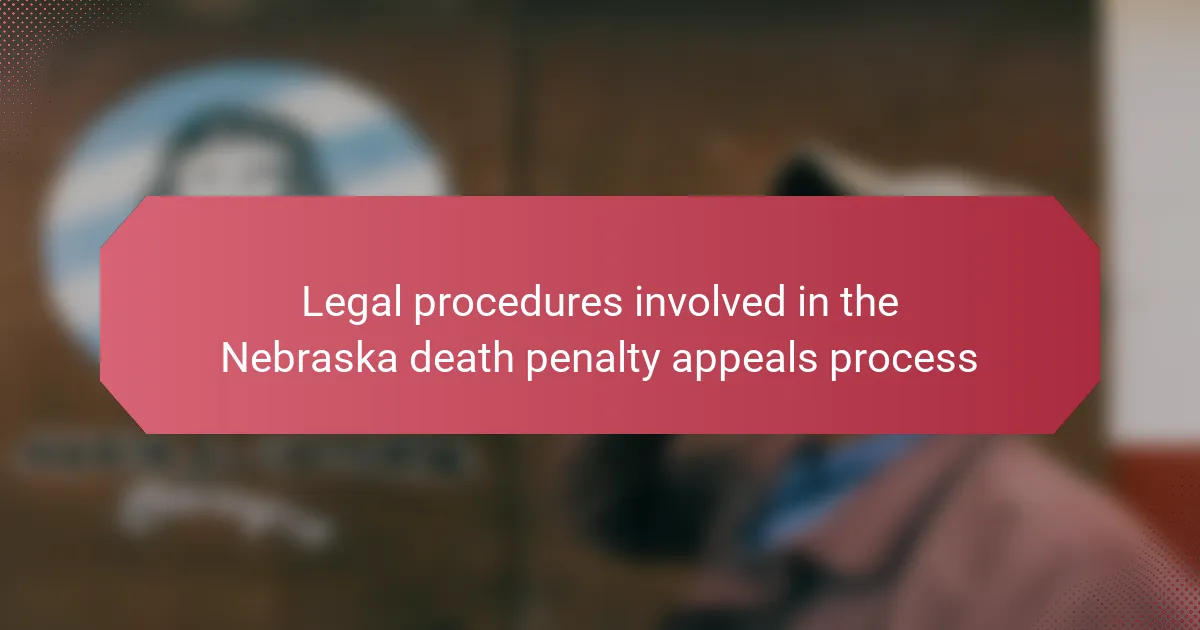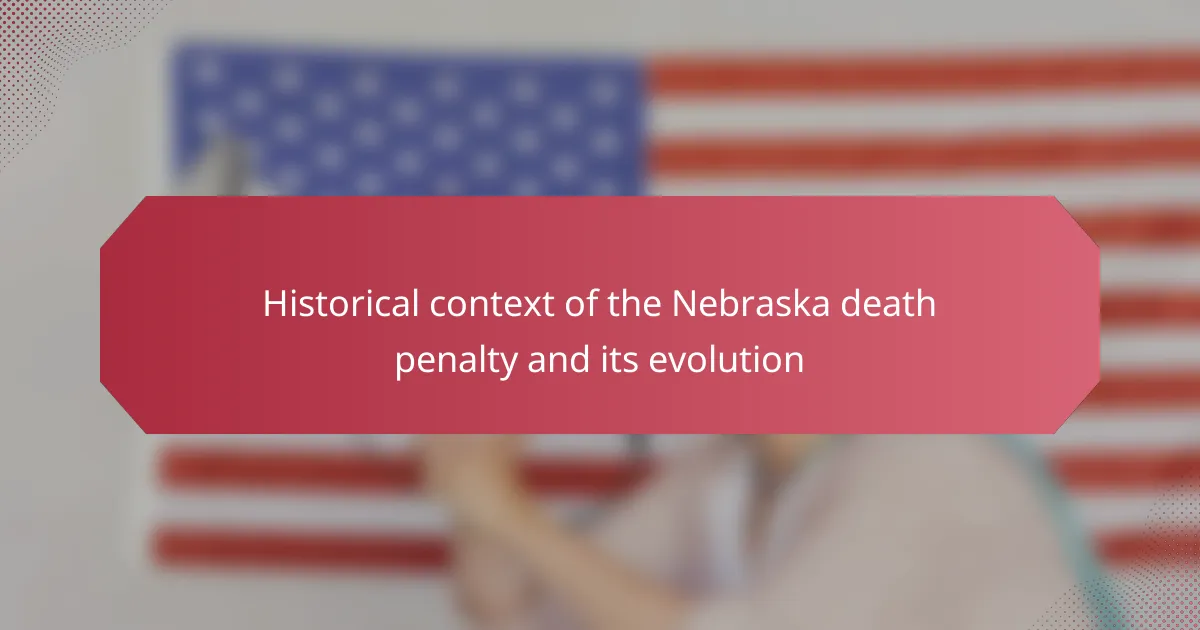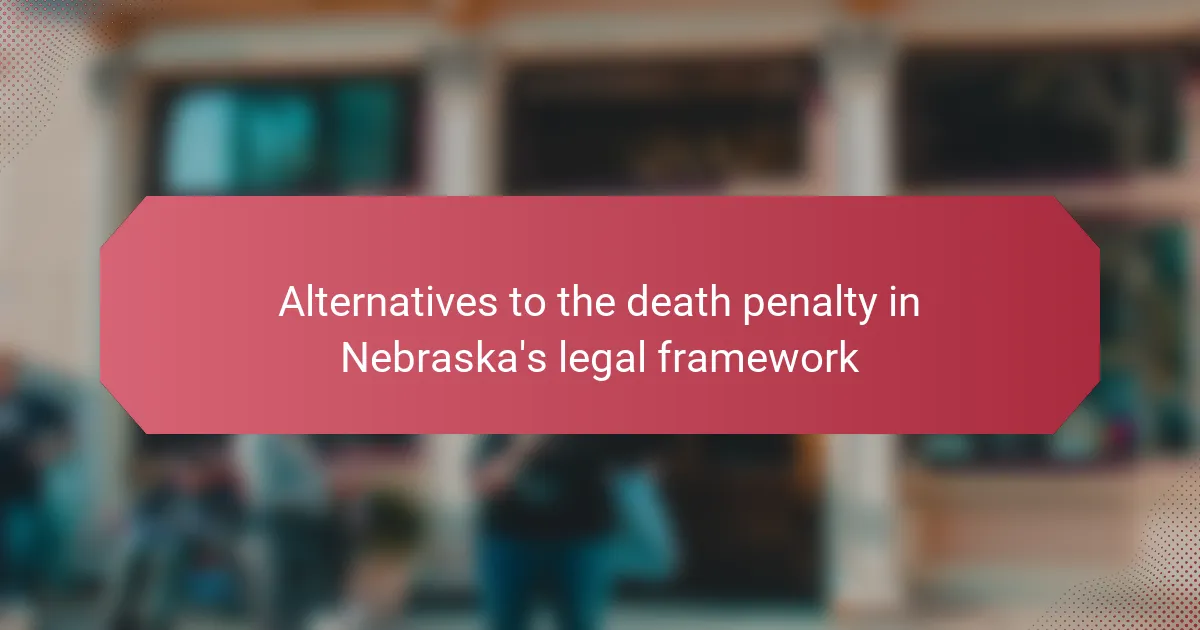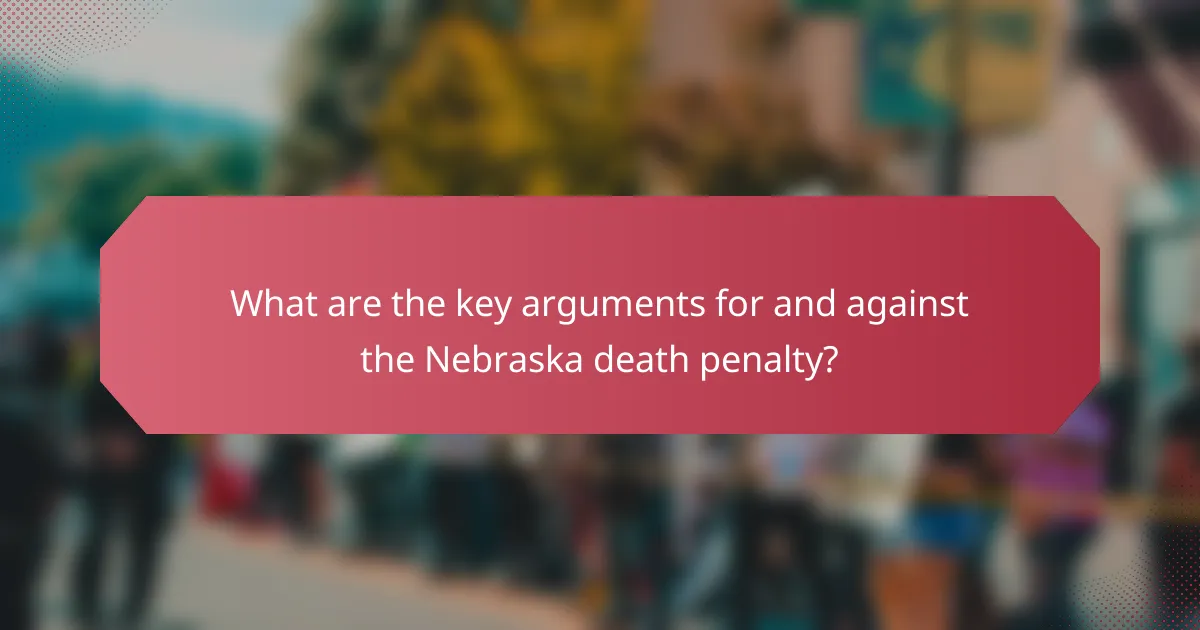
What are the key arguments for and against the Nebraska death penalty?
The key arguments for the Nebraska death penalty include deterrence and justice for victims. Proponents argue that capital punishment deters violent crime. They believe it provides justice and closure for victims’ families. Supporters also claim it serves as a tool for retribution against heinous crimes.
On the other hand, arguments against the Nebraska death penalty focus on morality and wrongful convictions. Opponents argue that it is inhumane and morally wrong to take a life. They highlight the risk of executing innocent individuals, citing that wrongful convictions can occur. Additionally, critics argue that it disproportionately affects marginalized communities. They believe that life imprisonment is a more humane and effective alternative.
Why is the Nebraska death penalty a controversial topic?
The Nebraska death penalty is controversial due to moral, legal, and practical concerns. Opponents argue that it is inhumane and prone to wrongful convictions. Studies show that wrongful executions have occurred in the U.S., raising questions about the justice system’s reliability. Additionally, the financial cost of maintaining death row is significantly higher than life imprisonment. Supporters claim it serves as a deterrent to violent crime. However, research indicates that states without the death penalty often have lower murder rates. Public opinion varies, with polls showing fluctuating support over the years. The debate continues as lawmakers and citizens grapple with ethical implications and the effectiveness of capital punishment.
What historical context surrounds the Nebraska death penalty?
The historical context surrounding the Nebraska death penalty includes its establishment and subsequent changes over time. The death penalty was first enacted in Nebraska in 1873. Initially, hanging was the primary method of execution. In 1972, the U.S. Supreme Court ruled in Furman v. Georgia, leading to a temporary halt of the death penalty across the country, including Nebraska.
In 1979, Nebraska reinstated the death penalty, adopting the electric chair as the execution method. In 2009, the state switched to lethal injection. The death penalty faced numerous legal challenges and public debates, reflecting changing societal views on capital punishment. In 2015, the Nebraska legislature voted to abolish the death penalty, but the governor vetoed the bill.
In 2016, voters reinstated the death penalty through a ballot measure. The historical shifts illustrate the ongoing contention surrounding its use in Nebraska, influenced by legal, political, and ethical considerations.
How have public opinions shifted regarding the death penalty in Nebraska?
Public opinions regarding the death penalty in Nebraska have shifted towards opposition in recent years. A 2020 poll indicated that 60% of Nebraskans favored abolishing the death penalty. This marked a significant change from earlier years when support was higher. Legislative actions have also influenced public sentiment. In 2015, Nebraska’s legislature voted to repeal the death penalty, although the decision was later overturned by a referendum. The repeal attempt highlighted growing concerns over wrongful convictions and the effectiveness of capital punishment. Additionally, advocacy from various groups has raised awareness of the ethical implications of the death penalty. As a result, many Nebraskans are now more inclined to support alternatives to capital punishment.
What are the main arguments in favor of the Nebraska death penalty?
The main arguments in favor of the Nebraska death penalty include deterrence, retribution, and closure for victims’ families. Proponents argue that the death penalty serves as a deterrent to violent crime. Studies suggest that the threat of capital punishment may discourage potential offenders. Additionally, supporters believe it provides a sense of justice and retribution for heinous crimes. They argue that it is a fitting punishment for the most severe offenses. Furthermore, many families of victims feel that the death penalty offers closure. They believe that executing the perpetrator can help them heal from their loss. These arguments collectively support the continuation of the death penalty in Nebraska.
How does the death penalty serve as a deterrent to crime?
The death penalty serves as a deterrent to crime by instilling fear of the ultimate punishment. This fear may discourage individuals from committing capital offenses. Research indicates that states with the death penalty have lower murder rates. For example, a study by the National Research Council found no conclusive evidence of deterrence from the death penalty. However, proponents argue that the potential of execution influences criminal behavior. They cite cases where individuals reconsidered their actions upon realizing the consequences. In summary, the death penalty is argued to deter crime through fear and the perception of consequences.
What are the moral arguments supporting the death penalty?
The moral arguments supporting the death penalty include retribution, deterrence, and justice. Retribution asserts that individuals who commit heinous crimes deserve to face severe consequences. This perspective views the death penalty as a form of societal revenge, restoring balance after a grave offense. Deterrence argues that the death penalty prevents future crimes by instilling fear of the ultimate punishment. Studies have shown that states with the death penalty may experience lower murder rates. Justice emphasizes the moral obligation to deliver appropriate punishment for the most egregious acts. The idea is that certain crimes are so severe that they warrant the ultimate sanction. These arguments reflect a belief in accountability and the protection of society.
How does the death penalty provide closure for victims’ families?
The death penalty can provide closure for victims’ families by delivering a sense of justice. Families often feel that the execution of the perpetrator validates their suffering. This sense of justice can alleviate feelings of anger and helplessness. Research indicates that many families believe that capital punishment serves as a deterrent against future crimes. Studies suggest that the finality of the death penalty can help families move forward. Victims’ families sometimes report a feeling of relief after the execution. This relief can stem from the belief that the perpetrator can no longer harm others. Overall, the death penalty is viewed by some as a necessary step in the healing process for those affected by violent crime.
What are the key arguments against the Nebraska death penalty?
The key arguments against the Nebraska death penalty include its high financial cost, potential for wrongful convictions, and lack of deterrent effect on crime. The cost of the death penalty in Nebraska is significantly higher than life imprisonment, with estimates showing that it can exceed $1 million per case due to lengthy legal processes. Wrongful convictions are a critical concern, as DNA evidence has exonerated several death row inmates nationwide, raising doubts about the system’s reliability. Additionally, studies indicate that states with the death penalty do not have lower crime rates compared to those without it, suggesting it does not effectively deter violent crimes. These factors contribute to the ongoing debate about the morality and efficacy of capital punishment in Nebraska.
What are the ethical concerns surrounding capital punishment?
Ethical concerns surrounding capital punishment include the risk of wrongful execution. Studies indicate that wrongful convictions can occur, leading to innocent individuals being sentenced to death. This raises questions about the infallibility of the justice system. Another concern is the disproportionate impact on marginalized groups. Research shows that racial and socioeconomic biases can influence sentencing. Additionally, capital punishment is argued to violate human rights. Many organizations, including Amnesty International, view it as a form of cruel and unusual punishment. The moral implications of state-sanctioned death also provoke significant debate. Critics argue that it undermines the value of human life. These ethical concerns contribute to ongoing discussions about the validity of capital punishment.
How does the risk of wrongful convictions impact the death penalty debate?
The risk of wrongful convictions significantly influences the death penalty debate. This concern raises questions about the infallibility of the justice system. According to the Innocence Project, over 20 people have been exonerated from death row in the United States due to wrongful convictions. Such cases highlight the irreversible nature of capital punishment. The potential for executing an innocent person generates public outcry and ethical dilemmas. Additionally, studies show that wrongful convictions disproportionately affect marginalized groups. This reality fuels arguments against the death penalty, emphasizing the need for reform. The fear of irreversible mistakes contributes to growing calls for its abolition.
What are the financial implications of maintaining the death penalty?
Maintaining the death penalty incurs significant financial costs. The expenses include legal fees, court costs, and lengthy incarceration. Capital cases often require more resources than non-capital cases. Studies show that death penalty cases can cost up to three times more than life imprisonment without parole. For instance, a report from the Nebraska Legislative Fiscal Office indicated that the death penalty costs the state approximately $14 million annually. These costs arise from trials, appeals, and prolonged detention on death row. Additionally, the financial burden impacts taxpayers and state budgets. Overall, the financial implications of maintaining the death penalty are substantial and often debated.
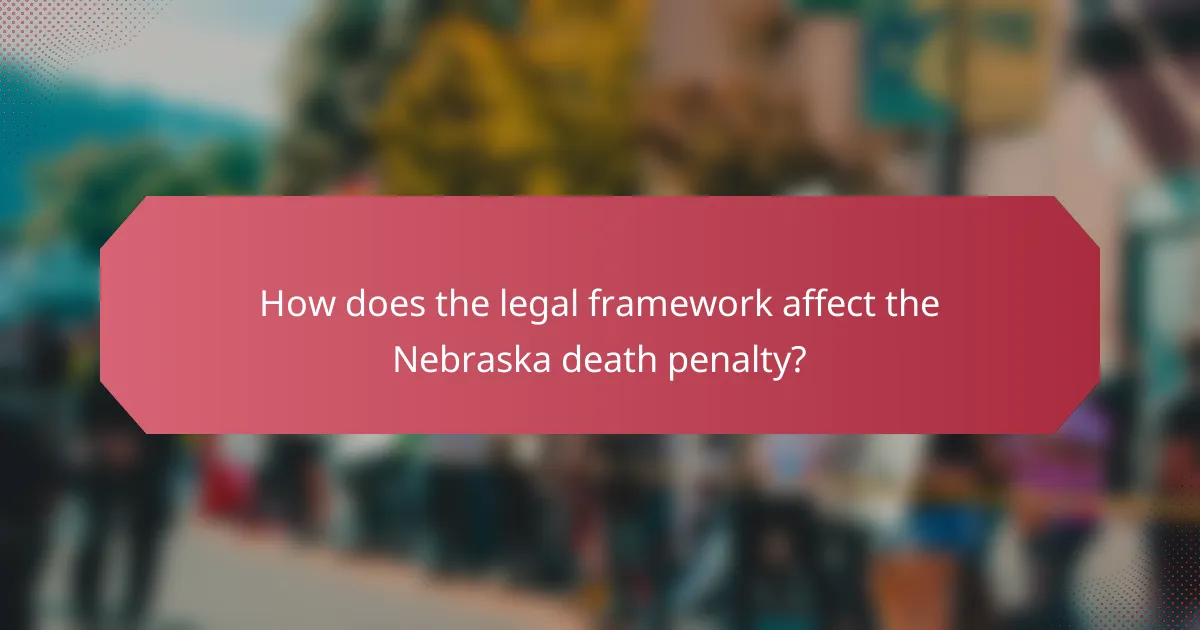
How does the legal framework affect the Nebraska death penalty?
The legal framework significantly influences the Nebraska death penalty. It establishes the procedures for capital punishment, including sentencing and appeals. Nebraska’s legal system mandates that death penalty cases undergo rigorous scrutiny. This includes a requirement for a unanimous jury decision for death sentences. Changes in legislation can alter the application of the death penalty. For instance, in 2015, Nebraska abolished the death penalty, which was later reinstated in 2016 through a voter referendum. Legal challenges can also affect execution methods and protocols. The framework ensures that constitutional rights are upheld during the capital punishment process. Overall, the legal framework shapes the practicality and implementation of the death penalty in Nebraska.
What laws govern the implementation of the death penalty in Nebraska?
The laws governing the implementation of the death penalty in Nebraska are primarily found in the Nebraska Revised Statutes. Specifically, sections 29-2519 to 29-2530 outline the procedures and regulations related to capital punishment. These laws detail the sentencing process, methods of execution, and appeals related to death penalty cases. Nebraska’s death penalty law was reinstated in 2016 after a voter referendum reversed a previous repeal. The state currently utilizes lethal injection as the method of execution. Additionally, the law requires a bifurcated trial process, where the jury first determines guilt and then decides on the sentence.
How have recent legislative changes impacted the death penalty process?
Recent legislative changes have significantly altered the death penalty process in Nebraska. The state has seen a shift towards more restrictive measures regarding capital punishment. For instance, in 2015, the Nebraska legislature voted to abolish the death penalty, which was a historic move. However, this decision was later overturned by a voter referendum in 2016, reinstating capital punishment. These changes have created uncertainty and debate surrounding the application of the death penalty. Additionally, legislative changes have introduced new protocols for execution methods and appeals. This has led to delays and complications in carrying out death sentences. Overall, the legislative landscape continues to evolve, impacting the overall administration of the death penalty in Nebraska.
What role do appeals play in capital punishment cases in Nebraska?
Appeals play a critical role in capital punishment cases in Nebraska. They provide a mechanism for defendants to challenge their convictions and sentences. The appeals process can address legal errors that may have occurred during the trial. This includes issues related to jury selection, evidence admission, and sentencing procedures. Nebraska law allows for direct appeals to the Nebraska Supreme Court. Additionally, post-conviction relief can be sought through state or federal courts. These processes ensure that defendants receive a fair review of their cases. The appeals can take years to resolve, often delaying executions. In Nebraska, appeals are essential for upholding justice and ensuring due process for those facing the death penalty.
What is the role of the Nebraska Supreme Court in death penalty cases?
The Nebraska Supreme Court reviews death penalty cases to ensure legal compliance. It evaluates the constitutionality of sentences and procedures used in capital cases. The court addresses appeals from lower courts regarding convictions and sentences. It examines claims of ineffective legal representation and prosecutorial misconduct. The Nebraska Supreme Court also considers issues related to jury instructions and evidence admissibility. Its rulings can uphold, modify, or overturn death sentences. The court’s decisions impact the application of the death penalty in Nebraska. This role is crucial in maintaining judicial integrity and protecting defendants’ rights.
How does the court’s interpretation of laws affect death penalty rulings?
The court’s interpretation of laws significantly influences death penalty rulings. Courts assess the constitutionality of death penalty statutes. Their interpretations can lead to the upholding or striking down of these laws. For example, the U.S. Supreme Court has ruled on issues like cruel and unusual punishment. These rulings directly affect state implementation of the death penalty. In Nebraska, the court’s interpretation can determine whether certain methods of execution are permissible. Additionally, judicial interpretations can influence public policy and legislative changes regarding capital punishment. Thus, the court’s decisions shape the legal landscape surrounding the death penalty.
What notable cases have shaped the Nebraska death penalty landscape?
The notable cases that have shaped the Nebraska death penalty landscape include State v. Mata, State v. McCoy, and State v. McGhee. In State v. Mata (2014), the Nebraska Supreme Court ruled on the constitutionality of the death penalty in light of the state’s lethal injection protocol. This case highlighted concerns regarding the method of execution and its potential cruelty. State v. McCoy (2005) addressed the issue of mental competency in death penalty cases, establishing that individuals with intellectual disabilities cannot be executed. Additionally, State v. McGhee (2005) involved a significant ruling on the application of the death penalty in cases of severe mental illness. These cases collectively influenced public perception and legal standards surrounding capital punishment in Nebraska.
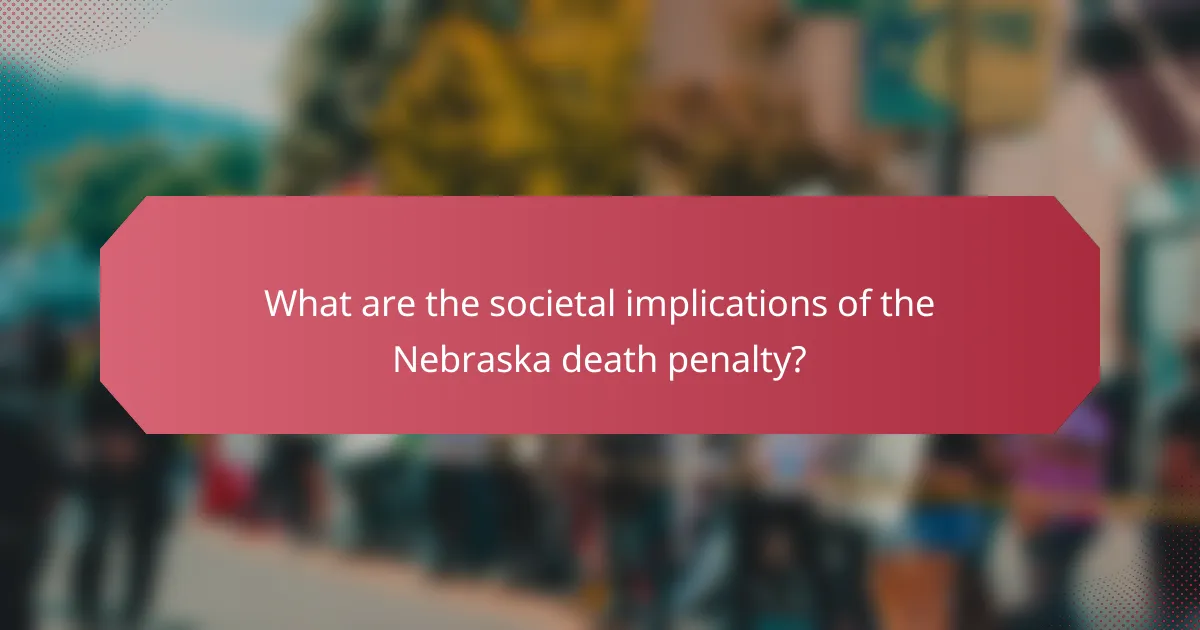
What are the societal implications of the Nebraska death penalty?
The societal implications of the Nebraska death penalty include moral, economic, and racial considerations. The death penalty raises ethical debates about justice and human rights. Critics argue it perpetuates a cycle of violence. A 2016 study indicated that capital cases cost significantly more than life imprisonment. Racial disparities exist, with minorities disproportionately sentenced to death. This raises concerns about fairness in the judicial system. Public opinion varies, influencing political and legislative actions. In Nebraska, legislative attempts to abolish the death penalty reflect changing societal values. Overall, the death penalty’s implications are complex and multifaceted.
How does the death penalty impact crime rates in Nebraska?
The death penalty has a complex impact on crime rates in Nebraska. Research indicates that states with the death penalty do not necessarily experience lower crime rates. A study by the National Research Council found no credible evidence that the death penalty deters crime more effectively than life imprisonment. In Nebraska, the murder rate has fluctuated over the years, with no clear correlation to the presence of the death penalty. For example, the murder rate in Nebraska was 1.9 per 100,000 people in 2019, which is similar to rates in states without the death penalty. This suggests that the death penalty may not serve as an effective deterrent to violent crime in Nebraska.
What are the psychological effects on those involved in death penalty cases?
The psychological effects on those involved in death penalty cases can be profound and varied. Individuals such as jurors, victims’ families, and executioners often experience significant emotional distress. Jurors may face moral dilemmas and guilt over their decisions. Victims’ families might endure prolonged grief and trauma related to the crime and the execution. Executioners often report feelings of conflict and psychological burden associated with carrying out lethal injections. Research indicates that these psychological impacts can lead to anxiety, depression, and post-traumatic stress disorder (PTSD) among those involved. A study published in the journal “Death Studies” identified that jurors frequently experience anxiety and guilt after participating in capital cases. The psychological ramifications are significant and can persist long after the case is concluded.
How does the death penalty influence Nebraska’s reputation nationally?
The death penalty significantly influences Nebraska’s reputation nationally by positioning the state as a focal point in debates over capital punishment. Nebraska’s retention of the death penalty contrasts with a growing trend among states to abolish it. This stance attracts attention from both proponents and opponents of capital punishment. Critics argue that it reflects a more punitive justice system, which can deter progressive perceptions. Supporters claim it serves as a necessary deterrent against heinous crimes. The state’s legal battles and public opinion shifts further shape its national image. For instance, Nebraska’s 2015 legislative repeal, later overturned, highlighted deep divisions on the issue. Consequently, Nebraska remains a key player in the ongoing national discourse surrounding the death penalty.
What alternatives to the death penalty are being considered in Nebraska?
Nebraska is considering alternatives to the death penalty such as life imprisonment without parole. This option provides a severe punishment without the ethical concerns surrounding capital punishment. Additionally, some lawmakers have proposed restorative justice measures. These measures focus on rehabilitation and reconciliation rather than retribution. The discussions around these alternatives reflect a shift in public opinion regarding the effectiveness of the death penalty. Recent surveys indicate that many Nebraskans support life sentences over executions. These considerations are part of ongoing legislative debates in the state.
How effective are life sentences without parole as a substitute?
Life sentences without parole are considered an effective substitute for the death penalty in many contexts. They ensure that individuals convicted of serious crimes remain incarcerated for life, thus removing them from society. This approach also eliminates the moral and ethical concerns associated with capital punishment. Research indicates that life sentences can lead to significant cost savings compared to lengthy death penalty appeals. For example, a study by the Nebraska Legislative Fiscal Office found that life sentences without parole are less expensive than pursuing death penalty cases. Additionally, life sentences provide a chance for rehabilitation, which is not possible with the death penalty.
What reforms are being proposed to address concerns with the death penalty?
Proposed reforms to address concerns with the death penalty include a moratorium on executions. This allows for a thorough review of the legal processes involved. Additionally, there are calls for the abolition of the death penalty altogether. Advocates argue that it is costly and disproportionately affects marginalized communities. Other proposals include improved legal representation for defendants. This aims to ensure fair trials and reduce wrongful convictions. Some states are considering alternatives, such as life imprisonment without parole. These reforms are supported by various human rights organizations and legal experts. They highlight the need for a more humane and just criminal justice system.
What practical steps can be taken to engage in the death penalty debate?
To engage in the death penalty debate, individuals can take several practical steps. First, they should educate themselves on the laws and statistics related to the death penalty in Nebraska. Understanding the historical context and current legal framework is essential. Second, attending public forums or debates can provide insights and diverse perspectives. Engaging with community organizations that focus on criminal justice reform is another effective step. These organizations often host discussions and provide resources. Additionally, individuals can participate in advocacy campaigns, such as signing petitions or contacting lawmakers. Sharing information on social media can raise awareness and stimulate discussion. Finally, reading scholarly articles and research studies enhances understanding of the implications of the death penalty. Engaging in respectful dialogue with opposing viewpoints is crucial for a comprehensive debate.
The main entity of this article is the Nebraska death penalty, which is examined through key arguments for and against its implementation. Proponents argue that it serves as a deterrent to violent crime, provides justice for victims’ families, and acts as a tool for retribution. Conversely, opponents highlight moral concerns, the risk of wrongful convictions, and the disproportionate impact on marginalized communities. The article also addresses the historical context, public opinion shifts, financial implications, and recent legislative changes surrounding the death penalty in Nebraska, providing a comprehensive overview of the ongoing debate.
